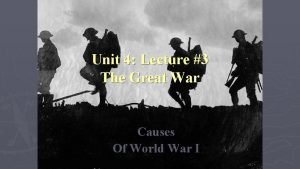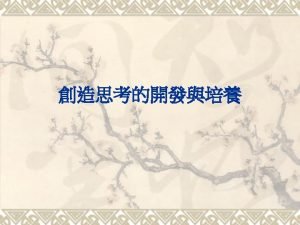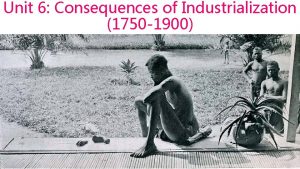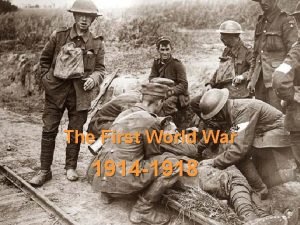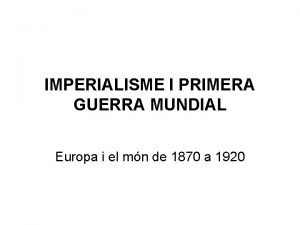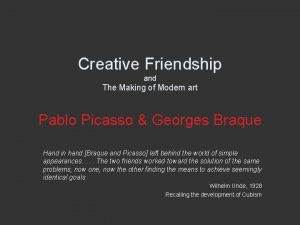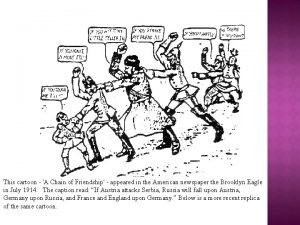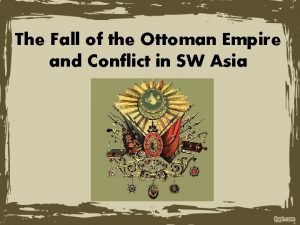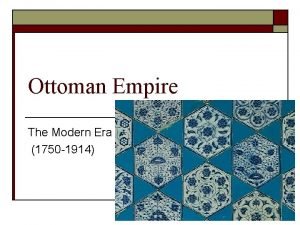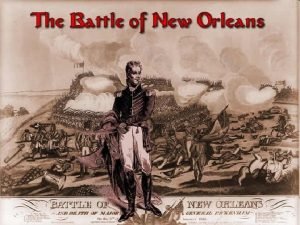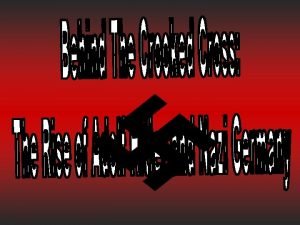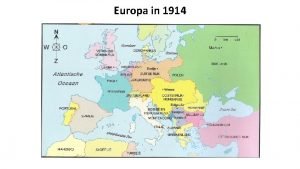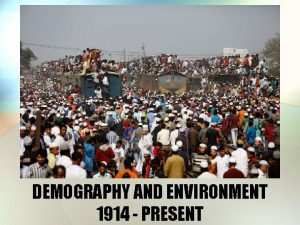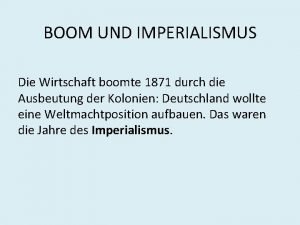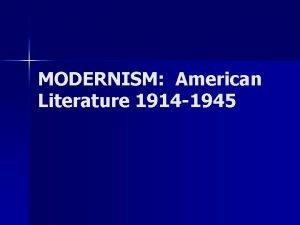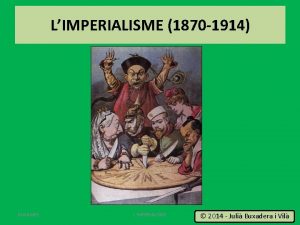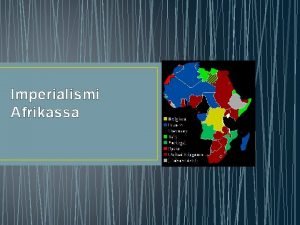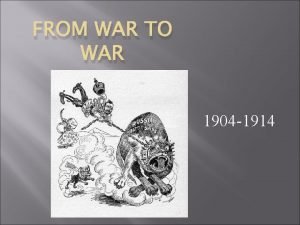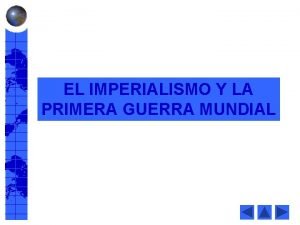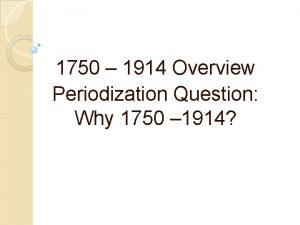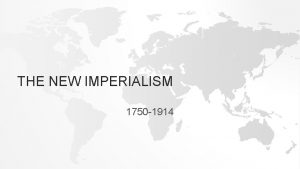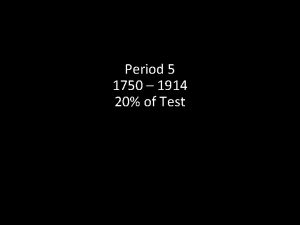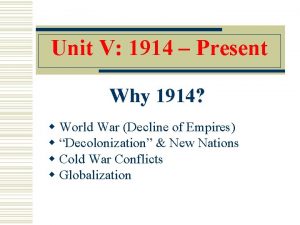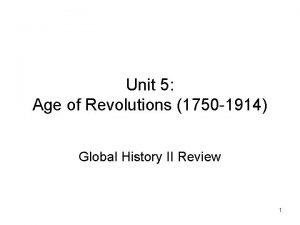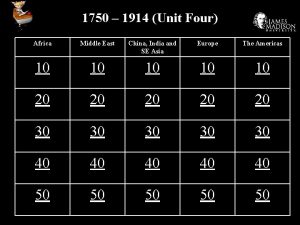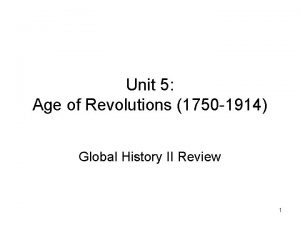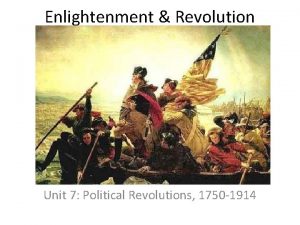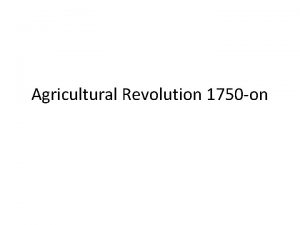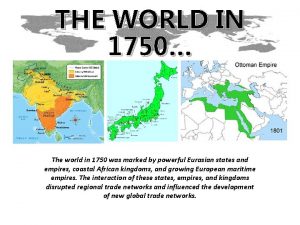UNIT IV 1750 1914 Why 1750 1914 1750















































- Slides: 47

UNIT IV: 1750 -1914 Why 1750 – 1914? 1750 – Start of political revolutions, industrial revolution, capitalism 1914 – WWI, Decline of Empires (Ottoman, Qing, Czarist Russia, Austro-Hungary)

The Two “I’s” 1. INDUSTRIALIZATION: INDUSTRIALIZATION traditional/religious life under immense pressure by industrial life & new scientific discoveries 2. IMPERIALISM: IMPERIALISM leads to the development of Land AND sea-based empires – Nationalism (introduced by the French Revolution) – In order to justify imperialism: idea of ‘race’ developed by the West

Big Picture Themes v. Political Revolutions v. Dominance of the West v. Reactions to Imperialism v. Global Trade v. New Economic Systems (capitalism, Marxism) v. Demographic Shifts

The West: W. Europe U. S. A Australia Industrialized societies & militaries Influenced by nationalism & science Who is Who? The “Wannabes”: Russia Japan Ottomans Everyone Else: Gov’t programs to industrialize Colonized by West or under “sphere of influence” to West Imported tech & and western ideas All attempt to throw out the West, but FAIL… EXCEPT L. American Independence

Political Rev. & Independence: Why now? Where? • • U. S. (1776) France (1789) Haiti (1803) Latin America (1800 s)

American Rev. • No taxation w/out representation • July 4, 1776: Dec. of Independence • 7 Years War Britsh vs. French): “ 1 st World War”

French Revolution • Louis XVI overtaxation • Enlightenment ideas (rights & science) 3 rd Estate (lower class): paid all taxes – swore a “Tennis Court Oath” for a constitution: Declaration of the rights of Man – universal male suffrage • July 14, 1789: storming the Bastille prison starts rev.

Radical phase • led by Maximilen Robespierre (of Jacobin party) • Louis XVI & wife executed during Reign of Terror • Final phase of rev. : Napoleon staged a coup of the Directory – From 1799 -1815 France became an empire

Which of the following is a TRUE statement about the French Revolution of 1789? (A) It failed to instill a sense of nationalism in France. (B) Women gained universal suffrage. (C) The revolution turned radical with the involvement of peasants. (D) It succeeded in strengthening France’s economy.

Haitian Revolution Toussaint L’Ouverture

• Instability caused by French Rev. • Toussaint L’Ouverture organized small military group of slaves & “gens de couluer” couluer LEGACY: • Symbol of freedom to slaves • Kings/slave owners feared rebellion Toussaint L’Ouverture

Latin American Independence CAUSES • Political & Social Inequality – Creoles (rebelled the most) • Enlightenment Ideas • Other Revolutions • Napoleon’s invasion of Spain/Portugal


Leaders Father Miguel Hidalgo (1821): Mexican Independence Simon Bolivar: S. America Dom Pedro: Brazil

Causes/Motives: • 1800 s Rev. Causes: – – – nationalism peasant unrest food shortages publishing newspapers/newsletters Commercial Revolution (rising middle class) • Motive: need to industrialize & “modernize” nations

Modern political revolutions were characterized by (A) the unopposed rule of absolute monarchs (B) the influence of Enlightenment ideals (C) peasants and urban workers refusing to protest (D) the destruction of traditional religion (E) eventual choice of universal democracy instead of autocracy

The West At Its Peak • 1750 -1914: height of Western power • The French Revolution gave birth to idea of nationalism • Growth of Nation-states/empires – German unification (Bismarck’s realpolitik)

New Political Ideas

Tech. Advances: Steam engine: most important invention British textiles: 1 st mechanized industry (looms; spinning wheels) Transportation: Canals Railroads Steam ships

Industrial Rev. Social Changes: • Innovations in farming & enclosure acts: peasants in countryside out of work…move to cities for factory work • Industrial Working Class (poor, unskilled) • New Middle Class • Roles of women: – Working class women outside home – Upper Class women: confined

Power loom “Satanic” Milltown Fatcat Miner Street children

Factory Conditions • rigid, boring, long hours, dangerous • NO job security… • Women/children/immigrants paid less

Living Conditions Urbanization: • Cities crowded, dirty, & dangerous - no sanitation - no fire/police - no running water

Rise of Western Dominance Scramble for Africa: Berlin Conference (1884)

2009 AP® WORLD HISTORY FREE-RESPONSE QUESTIONS WORLD HISTORY SECTION II Part A (Suggested writing time— 40 minutes) Percent of Section II score— 33 1/3 1. Using the documents, analyze African actions and reactions in response to the European Scramble for Africa. Identify an additional type of document and explain how it would help in assessing African actions and reactions. Historical Background: In the three decades after the Berlin Conference on Africa (1884– 1885), European powers occupied and colonized areas in Africa, a process later termed the Scramble for Africa.




Imperialism: • Industrialization: new demand resources & labor • steam power, better guns, immunizations • “Social Darwinism” Darwinism gave West a sense of superiority…justified imperialism (White Man’s Burden)

“I contend that we are the first race in the world and that the more of the world we inhabit the better it is for the human race. . . I contend that every acre added to our territory provides for the birth of more of the English race, who otherwise would not be brought into existence. ” Cecil Rhodes' statement is consistent with which of the following? (A) Mercantilism (B) Social Darwinism (C) Marxism (D) Liberalism (E) Mandate of Heaven

CHINA AFRICA • SCRAMBLE FOR AFRICA • SHAKA ZULU (resistance) • BERLIN CONFERENCE • BOER WAR (Dutch vs. British) • OPIUM WARS • TREATY OF NANJING (1842) • TAIPING REBELLION (1850 -64) • BOXER REBELLION (1898 -1901): anti-British & anti-Qing JAPAN • MEIJI RESTORATION • MATTHEW PERRY • SINOJAPANESE WAR IMPERIALISM INDIA • JEWEL IN THE CROWN • BRITISH EAST INDIA CO. • COMPANY MEN • SEPOY MUTINY • QUEEN VICTORIA EUROPE • NATIONALISM • WHITE MAN’S BURDEN. • INDUSTRIAL REVOLUTION

Reaction to Imperialism? • Organized rebellions all failed from 1750 -1914 (EXCEPT in L. America) • Russia & Japan… – Imitating the West

The “Wannabes” Japan & Russia

Meiji Japan: • Arrival of U. S. navy (Commodore Perry): Perry forced industrialization on Japan • Led to Meiji Restoration: Restoration Emperor began gov’t sponsored modernization plan • Created a Parliament: an oligarchy w/ a few businesses (zaibatsu) zaibatsu • Japan colonizes Korea & China

Late-nineteenth-century Japanese industrialization differed from lateeighteenth-century British industrialization in that Japan’s industrialization (A) was sponsored by the state (B) was not based on fossil-fuel power (C) centered on exporting agricultural goods (D) used women in early factories

Russia • Peter the Great (1672 -1725): began Westernization • Like Japan, industrialization sponsored by gov’t • Russifiy: cultural pressure on conquered peoples • UNLIKE JAPAN: Russia NOT able to fully industrialize…too many serfs! – 1861 (Alexander II ends serfdom)

British E. I. C. • E. I. C. ran India w/ “Company Men” Men & Raj princes until the Sepoy Rebellion (1857) – Sepoy: paid Indian soldiers – then direct control of crown; Queen Victoria (Disraeli her advisor) • “Jewel in the crown” • India supplied Britain w/ cotton, indigo, salt, opium & tea.

Qing China • Lord Macartney attempts to open up Qing (1792) -“Tea Diplomacy”…epic failure • China economically/culturally isolated…yet largest economy -Qing horded silver causing inflation • British fight Opium Wars to open up Qing…Treaty of Nanking begins 100 yrs of British influence (Hong Kong) • Taiping Rebellion & Boxer Rebellion (both failed): throw out foreigners


The Islamic Heartland • Ottoman Empire: tried to reform its society & industrialize w/ Tanzimat Reforms (too little too late) – Janissary Corp very conservative & feared change… • Egypt falls under British influence under Muhammad Ali (cotton; Suez Canal)

Sub-Saharan Africa • Europeans: create tensions between ethnic groups • “Scramble for Africa” about resources: – metals, crops, ivory, diamonds (Cecil Rhodes), rubber (Belgian Congo)

Global Communication, & Tech – railroad, steam engine, telegraph – Suez Canal, Panama Canal

Demographic & ENV Changes • New immigration patterns • End of Atlantic Slave Trade: Trade caused need for cheap labor (children & immigrants) • Better medicine • Food Supply ↑

Changes in Social/Gender Structure Changed due to: • • Political Revolutions Industrial Revolution Enlightenment ideas Emancipation of Serfs and Slaves



Comparisons • Industrial revolution in western Europe and Japan (causes and early phases) • Revolutions (American, French, Haitian, Latin American, Mexican, and Chinese) • Reaction to foreign domination in Ottoman Empire, China, India and Japan.
 Pictures
Pictures Wtd unit 4 1914 beach road malaga wa 6090
Wtd unit 4 1914 beach road malaga wa 6090 Don't ask why why why
Don't ask why why why Convict food
Convict food Unit 10, unit 10 review tests, unit 10 general test
Unit 10, unit 10 review tests, unit 10 general test In 1914 who controlled the shaded areas on the map
In 1914 who controlled the shaded areas on the map Európa térképe 1914-ben
Európa térképe 1914-ben Colonial empires 1914
Colonial empires 1914 Dinant 1914
Dinant 1914 Imperialism map 1914
Imperialism map 1914 Bandera triple entente
Bandera triple entente Topovsko pitanje
Topovsko pitanje Picasso ma jolie 1914
Picasso ma jolie 1914 Imperis colonials 1914
Imperis colonials 1914 Hrvatska književnost od 1929 do 1952
Hrvatska književnost od 1929 do 1952 Hrvatska književnost od 1914 do 1929
Hrvatska književnost od 1914 do 1929 Picasso ma jolie 1914
Picasso ma jolie 1914 Colonial empires 1914
Colonial empires 1914 Who drew the chain of friendship
Who drew the chain of friendship Ottoman empire 1914
Ottoman empire 1914 Ottoman empire 1914
Ottoman empire 1914 1920 moda
1920 moda In 1819 we took a little trip
In 1819 we took a little trip Braves
Braves 1914 1918
1914 1918 Nazi party
Nazi party Protagonista de niebla
Protagonista de niebla La treve de noel 1914 film
La treve de noel 1914 film Europa in 1914
Europa in 1914 World population in 1914
World population in 1914 607 b.c.e. 1914
607 b.c.e. 1914 Born on may 12, 1914, in dallas, texas.
Born on may 12, 1914, in dallas, texas. Kolonien afrika 1914
Kolonien afrika 1914 Eastern front ww1 map
Eastern front ww1 map American literature 1865 to 1914
American literature 1865 to 1914 Modernism and realism
Modernism and realism Imperis colonials 1914
Imperis colonials 1914 Sarajevo 28 giugno 1914
Sarajevo 28 giugno 1914 Frise chronologique de 1815 à 1870
Frise chronologique de 1815 à 1870 Imperialismi afrikassa
Imperialismi afrikassa 1904-1914
1904-1914 Magdalena geka
Magdalena geka Sebab khusus perang dunia 1
Sebab khusus perang dunia 1 Efg 1914
Efg 1914 Primera guerra mundial causas
Primera guerra mundial causas Map of europe 1914
Map of europe 1914 Lasted until 1914
Lasted until 1914 Mughal empire 1450 to 1750
Mughal empire 1450 to 1750

